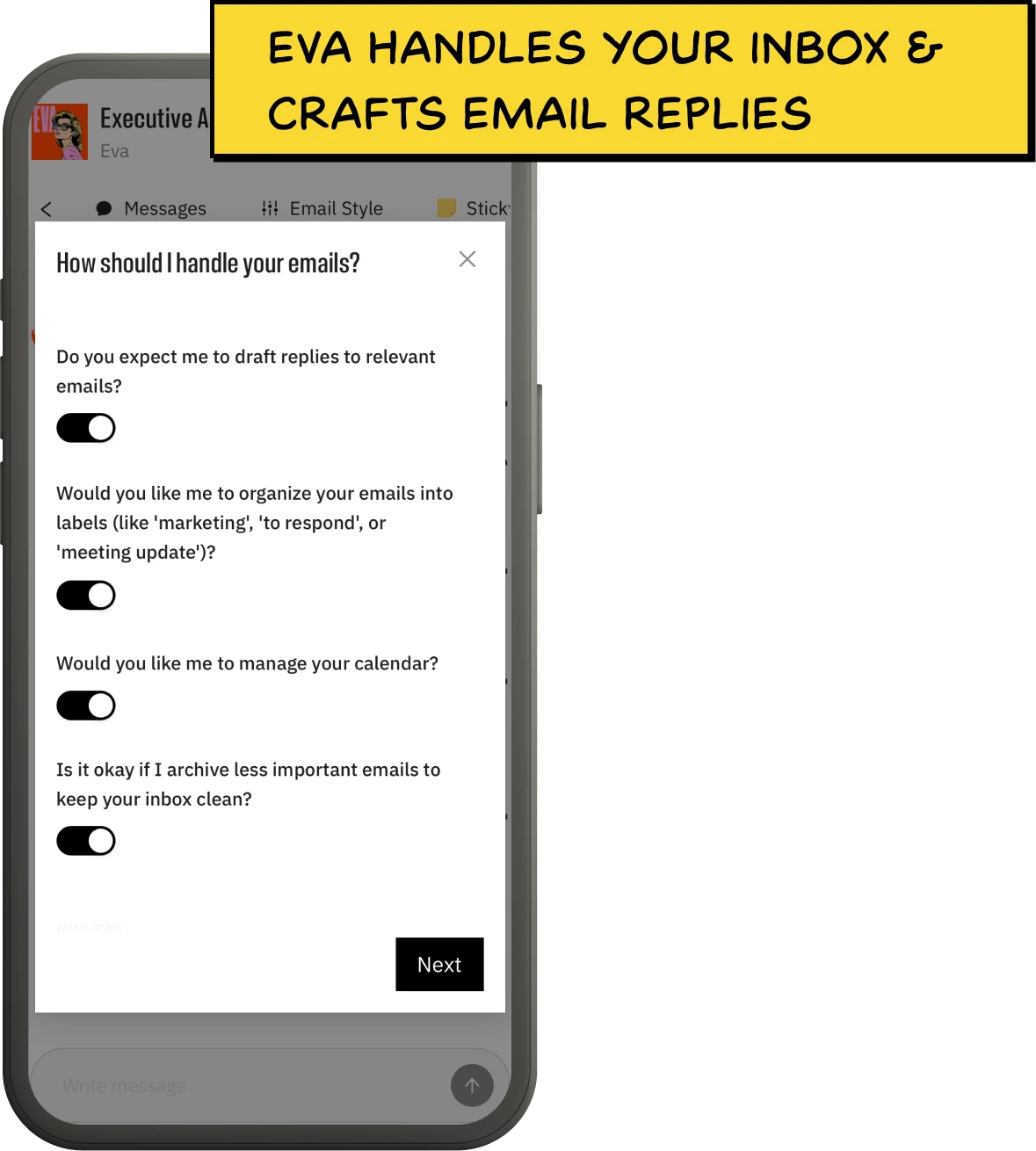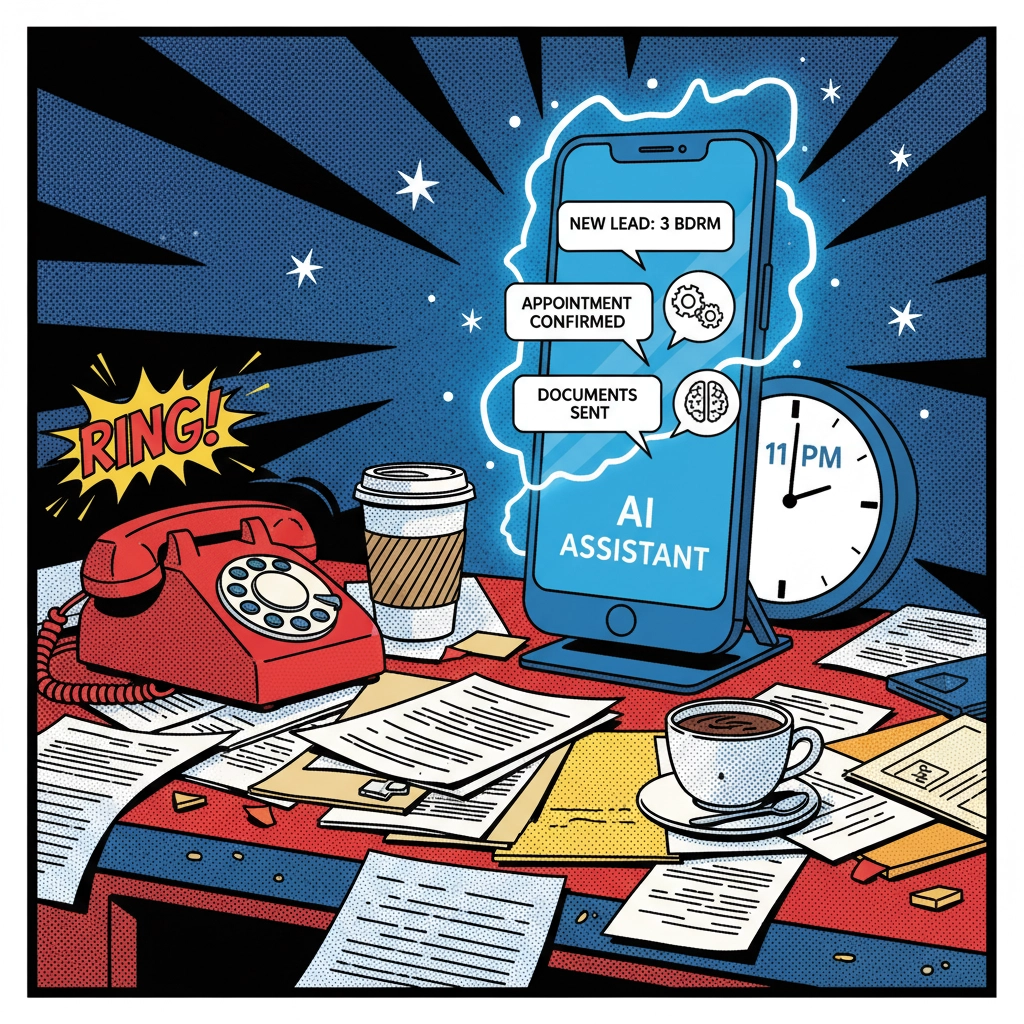Picture this: It's 11 PM on a Tuesday, and Sarah, a top-performing realtor in Austin, is finally wrapping up her day. Her phone buzzes with a new lead inquiry about a $650K listing. In the old days, that lead would sit cold until morning: maybe losing interest to a competitor who responded faster.
Not anymore.
While Sarah sleeps, her AI executive assistant is already qualifying the prospect, scheduling a viewing for the next day, and sending a personalized follow-up with comparable properties in the area. By the time Sarah checks her phone at 7 AM, she's got a warm, pre-qualified lead ready to move forward.
"The fastest way to lose a deal in real estate isn't bad negotiation: it's slow response time."
This isn't science fiction. It's happening right now in real estate offices across the country, and agents who aren't leveraging AI executive assistants are getting left behind.
The Real Estate Speed Problem
Let's be honest: the traditional real estate process is painfully slow. Between lead qualification, endless phone tag, scheduling conflicts, and administrative busywork, the average deal takes 30-45 days to close. But here's what most agents don't realize: at least 60% of that time is spent on tasks that an AI assistant can handle better, faster, and more consistently than any human.
The McKinsey Global Institute found that automation can reduce time spent on repetitive tasks by up to 60%. In real estate terms, that's the difference between closing 8 deals a year and closing 20.

What AI Executive Assistants Actually Do for Realtors
Think of an AI executive assistant as your most reliable team member who never takes a sick day, never misses a follow-up, and works 24/7 without overtime pay. Here's exactly how they're accelerating closings:
Instant Lead Qualification and Scoring
The moment a potential buyer hits your website or responds to a listing, your AI assistant jumps into action. It asks the right questions: budget range, timeline, financing pre-approval status, must-have features. Within minutes, you know if you're dealing with a serious buyer or someone just browsing.
"91% of buyers value responsiveness in an agent, and AI assistants help meet that expectation around the clock."
Smart agents are using tools that automatically score leads based on responses, so you can prioritize your time on prospects most likely to close. No more wasting Saturday mornings showing houses to people who can't get financing.
24/7 Client Communication
Your AI assistant handles the initial conversations, answers common questions about neighborhoods, school districts, and property details, and keeps prospects engaged while you're with other clients. It's like having a knowledgeable team member who never sleeps.

Automated Follow-Up Sequences
This is where most agents drop the ball. You meet a potential client, exchange information, then life gets busy and follow-up falls through the cracks. AI assistants solve this by managing personalized drip campaigns that keep you top-of-mind without any manual effort.
The Time Savings Breakdown
Here's exactly where AI executive assistants are saving agents the most time:
| Task Category | Traditional Time (Weekly) | AI-Assisted Time | Time Saved |
|---|---|---|---|
| Lead Qualification | 8 hours | 2 hours | 6 hours |
| Email Management | 6 hours | 1 hour | 5 hours |
| Scheduling/Calendar | 4 hours | 30 minutes | 3.5 hours |
| Follow-up Communications | 5 hours | 1 hour | 4 hours |
| Administrative Tasks | 7 hours | 2 hours | 5 hours |
| Total Weekly Savings | 30 hours | 6.5 hours | 23.5 hours |
That's an extra day and a half every week to focus on what actually generates revenue: building relationships, showing properties, and closing deals.
Real-World Implementation Checklist
Ready to get your AI executive assistant working for you? Here's your step-by-step implementation guide:
Getting Started ✓
- Audit your current lead response time (most agents are shocked by this number)
- Identify your most time-consuming repetitive tasks
- Set up basic qualification questions for different property types
- Create template responses for common inquiries
Advanced Setup ✓
- Configure lead scoring based on your ideal client profile
- Set up automated follow-up sequences for different buyer personas
- Integrate with your existing CRM system
- Create neighborhood-specific information packets
- Establish emergency escalation protocols for high-priority leads
Optimization ✓
- Review and refine AI responses based on client feedback
- Track conversion rates from AI-qualified leads vs. traditional leads
- Expand automation to listing management and client updates
- Train your AI on your specific market knowledge and expertise

The Competitive Edge
Here's what successful agents understand: while their competitors are still playing phone tag and manually sorting through unqualified leads, they're focusing their energy on the high-value activities that actually close deals.
Take Eva, for instance: Marblism's AI Executive Assistant that's helping real estate professionals manage hundreds of client communications while maintaining that personal touch that clients expect. She handles email organization, schedules viewings, and ensures no lead falls through the cracks.
"The real power of AI executive assistants lies not in replacing agent expertise, but in multiplying agent effectiveness."
Beyond Just Speed: Quality Improvements
It's not just about doing things faster: AI assistants actually improve the quality of client interactions. They ensure consistent messaging, never forget to follow up, and provide detailed records of every client interaction. This leads to:
- Higher client satisfaction scores
- More referrals from satisfied customers
- Fewer deals falling through due to poor communication
- Better long-term client relationships

Common Concerns (And Why They're Wrong)
"But real estate is a relationship business!"
Absolutely right. That's exactly why you should automate the routine stuff so you can spend more time building actual relationships. Your AI assistant handles the logistics so you can focus on understanding client needs, negotiating deals, and providing expert market guidance.
"What about the personal touch?"
The best AI assistants maintain your voice and personality in communications. They're trained on your specific communication style and can personalize interactions based on client preferences and history.
The Bottom Line
The real estate agents crushing it in 2025 aren't necessarily the most experienced or the best negotiators. They're the ones who've figured out how to leverage technology to multiply their effectiveness.
While average agents are drowning in administrative tasks and slow response times, top performers are using AI executive assistants to handle the routine work, qualify leads instantly, and maintain consistent client communication around the clock.
The choice is simple: adapt and accelerate your closings, or watch more tech-savvy competitors capture market share while you're stuck in email hell and scheduling conflicts.
The agents who embrace AI executive assistants today will be the ones dominating their markets tomorrow. The question isn't whether you can afford to implement this technology: it's whether you can afford not to.
Your competition is already moving. The only question is: will you lead or follow?











